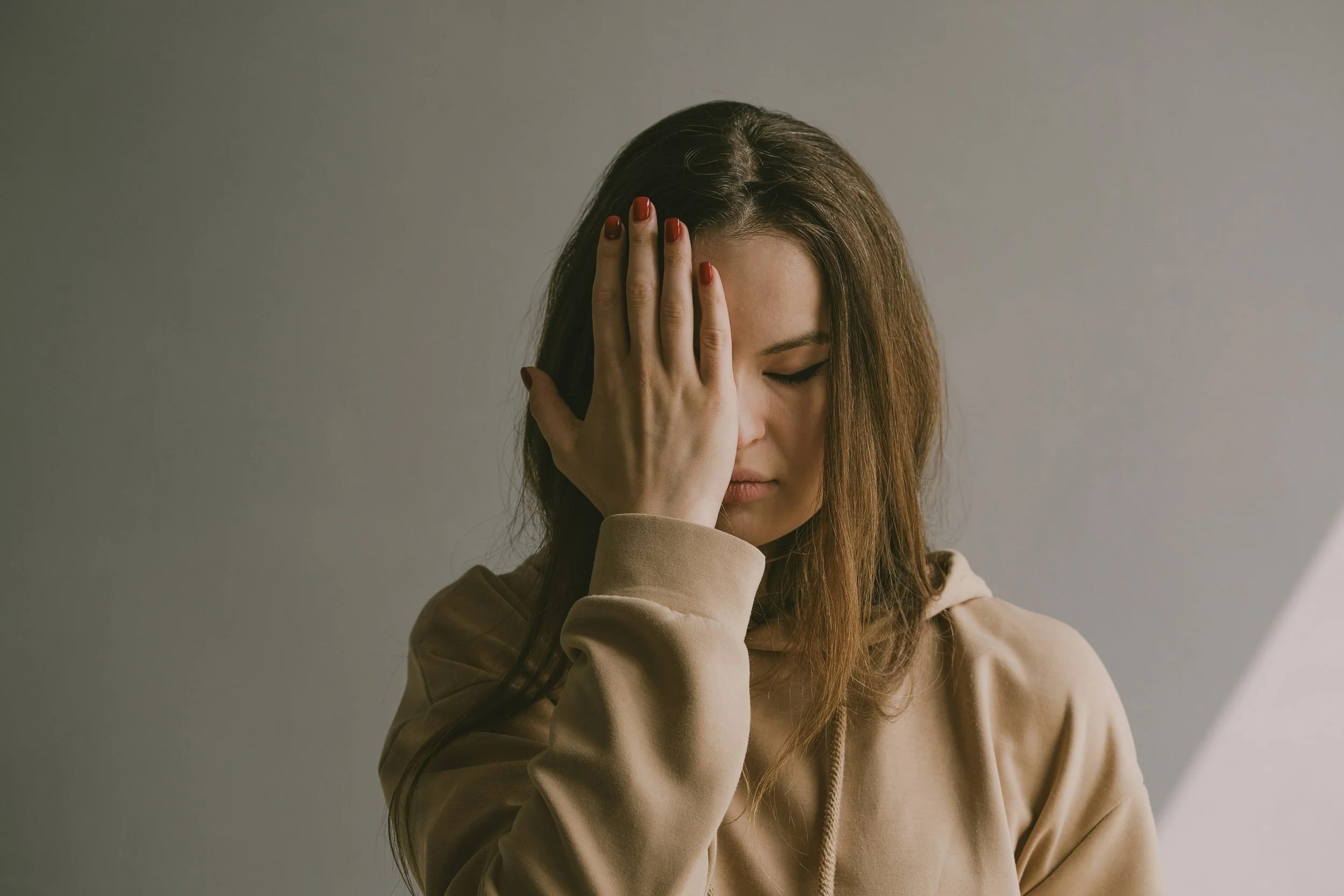SERVICE
Therapy for DePRESSION
on the sunshine coast
The term “feeling depressed” gets thrown around so often that its lost its true meaning. True clinical depression is much more than just feeling sad - it’s a mood disorder that persists, impairing someone’s everyday life and functioning.
What is DEPRESSION?
To be diagnosed with depression, several symptoms need to have been present for most of the time over the past two weeks. Common symptoms may include low mood, irritability, loss of interest or pleasure in activities once enjoyed, social withdrawal, trouble sleeping, fatigue, feeling worthless or excessively guilty, appetite changes, poor concentration and memory, or having suicidal thoughts.
What Causes DEPRESSION?
1 in 5 Australians will experience depression in their lifetime. It doesn’t have one single cause but is thought to result from stress interacting with certain vulnerability factors, such as:
• Genetics
• Stressful life changes
• Lifestyle factors (e.g. drugs, alcohol, poor nutrition, inactivity)
• Negative thought patterns
• Medical conditions
• Early experiences of loss
• Anxiety
WHAT HELPS REDUCE DEPRESSION?
There is hope. Depression is one of the most successfully treated mental health conditions.
• Psychological therapies: A psychologist can help you understand what’s behind your depression, what keeps it going, and what practical skills may help you overcome it.
• Medications: Severe or chronic depression may benefit from the additional antidepressants. Therapy is still recommended to help you build lasting skills to manage and prevent depression in the future.
• Lifestyle changes: Just like a car needs the right fuel, our body thrives on healthy habits. Regular exercise, good sleep, balanced nutrition, reducing stress, and avoiding alcohol and drugs can make a big difference.
What’s the next step?
• Chat with your GP: Talk to your doctor about how you are feeling. They can then rule out underlying medical conditions, like hypothyroidism, which may be causing the depression, or write you a Mental Health Care Plan to see a psychologist.
• Reach out: Reach out to supportive friends and family, and resist isolating yourself - it only worsens the depression.
• Small steps: Take small, manageable, healthy steps each day - drink more water, call a friend, or take a short walk. These small actions can build motivation and mood.
• Be kind to yourself: Be patient and kind to yourself.
FURTHER FACTS ABOUT DEPRESSION
• Psychological therapy and lifestyle changes are the best first-line treatment for mild and moderate levels of depression. For more severe and chronic cases, a combination of medication and therapy may be used. Whilst medication addresses biological factors, therapy teaches long-term coping skills to prevent relapse.
• In addition to Major Depressive Disorder, there are also other types of depression, such as Persistent Depressive Disorder (Dysthymia), Premenstrual Dysphoric Disorder, and Substance/Medication Induced Depressive Disorder, to name a few.
• Children and adolescents may exhibit irritability rather than low mood when depressed.
• Depression can present differently across cultures, sometimes showing up as physical symptoms like stomach aches or other bodily pains, rather than emotional ones.
• Depression and anxiety often go hand-in-hand and both need to be treated for a full recovery.
• Many people, even those that seem happy, become expert “maskers” of their depression. If you’re struggling, you may not be as alone as you think.
• Medication can take 6-8 weeks to start being effective and not every antidepressant may be right for you. It’s important to work closely with your doctor and give honest feedback to find what works best.
HELPFUL Resources
The Centre for Clinical Interventions https://www.cci.health.wa.gov.au/Resources/Looking-After-Yourself
This Way Up (free resource with a GP or psychologist referral) https://thiswayup.org.au
MiiND (free interactive mental health platform for young people) https://miind.org.au
More information ABOUT DEPRESSION
Helpful apps
Smiling Mind
Headspace
MindDoc
Beyond Now Safety Planning
ACT Companion: Happiness Trap
24/7 HELPLINES - Phone and web-based crisis counsellinG
Beyond Blue 1300 224 636 https://www.beyondblue.org.au/get-support
MensLine 1300 789 978 https://mensline.org.au
Lifeline 13 11 14 https://www.lifeline.org.au
Kids Helpline (5-25 years old) 1800 551 800 https://kidshelpline.com.au/young-adults/issues/all-about-depression
our team
you’re in good hands
Our team of psychologists are highly trained and qualified to support you on your well-being journey. Each psychologist holds at least a master’s degree and is committed to ongoing professional development, ensuring the highest standard of care. Beyond their professional skills, they are genuinely wonderful individuals who love what they do, creating a warm and welcoming environment for all.
Laura Scherman
Principal Clinical Psychologist
-
BPsychSc (Hons), MPsych(Clin), MAPS
Founder and Director of Full Life Psychology, Laura leads a unified, skilled team of compassionate therapists dedicated to helping people live a meaningful and FULL LIFE.
In her own clinical work, Laura values building strong therapeutic relationships with her clients and creates a warm, nurturing, and respectful space where people feel safe to freely talk through the challenges they are facing and to learn ways to better navigate them. Laura wants her clients to feel seen and heard and to know that they matter. Evidence-based therapies Laura uses include Cognitive Behaviour Therapy (CBT), Acceptance and Commitment Therapy (ACT), Schema Therapy, and more recently, Eye Movement Desentisation and Reprocessing (EMDR) Therapy. Laura works with clients aged 16 and up and has supported people from diverse backgrounds, such as working professionals, students, pastors and leaders, retirees, police officers, new parents, and more, always respecting their personal values and goals.
Areas of interest include:
Anxiety
Self-worth
Burnout
Adjustment issues
Resolving historical behaviour patterns
Women’s mental health
Health in leadership
Faith and psychology
Laura has experience presenting to groups of people in various educational and church settings. She lives on the Sunshine Coast with her husband and two children, and in her free time enjoys conversations with loved ones, creativity, traveling, and new experiences.
PIA SAUER
Provisional Psychologist
-
BPSYCH(HONS), MPROFPSYCH
Pia is a compassionate and warm Provisional Psychologist dedicated to providing a safe space for her clients to feel seen, accepted, and respected. Using a collaborative and non-judgemental approach to therapy, she is passionate about helping individuals across the lifespan overcome personal challenges, achieve their goals, and experience meaningful and lasting change.
Pia uses an evidence-based approach that is tailored to each client’s unique presenting difficulties and needs. She draws from a range of treatment modalities including cognitive behavioural therapy (CBT), acceptance and commitment therapy (ACT), dialectical behaviour therapy (DBT), and metacognitive therapy (MCT). She is able to provide services in English and German.
Her areas of interest include:
Anxiety and panic symptoms
Depression and mood disorders
Stress and burnout
Self-worth
Building resilience and coping skills
Perfectionism
Interpersonal challenges and conflict resolution
In her free time, Pia loves spending time embarking on spontaneous adventures with her family, exploring new coffee shops, dancing, and daydreaming about endless interior design projects.
DAVID BEAL
Psychologist
-
BA(HONS), BSC(PSYCH)(HONS), GDIPMIN, GDIPPSYCH, MPP, MAPS
David is an authentic, warm and caring Provisional Psychologist who has raised six children with his wife of over 20 years and as such has a wealth of lived experience that he brings to his role - particularly when working with children and parents. David loves getting to know people on a deep level - to really understand how they think and to create a safe space to work collaboratively together. David loves to work around building hope for his clients and is passionate about helping them understand their values and using this as the basis to support them to walk into the future they desire. David is trained in Cognitive Behavioural Therapy and Acceptance and Commitment Therapy and uses these plus other similar modalities to work with his clients.
David’s areas of interest include:
Men’s mental health
ASD
ADHD
Psychological assessment
Parenting and families
Anxiety and panic symptoms
Depression
Faith and psychology
In addition, David loves to talk about and watch sport, particularly Rugby Union, read books, chill out with black and white movies, relax with his dog - a beautiful Cavoodle called Texas, and explore different countries around the world.








